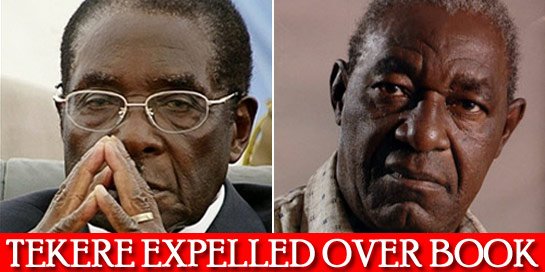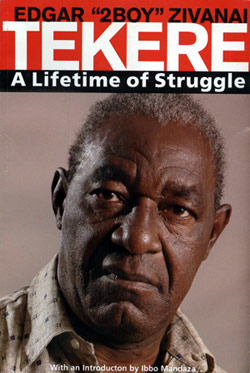| EDGAR TEKERE: THE BOOK THEY DON'T WANT YOU TO READ |
| The Chimoio massacre In his new book, A Lifetime of Struggle, Edgar Tekere delves into his controversial Life starting with his humble upbringing as the son of a Makoni Princess, his odssey into Mozambique at the side of Robert Mugabe, and his rise to prominence within the liberation movement of Zimbabwe. New Zimbabwe.com continues with its exclusive extracts from the book which captures some of the most extra-ordinary events during the bush war that led to the country's independence: Last updated: 03/02/2007 23:46:56 AS I have mentioned before, Chimoio was a complex of camps, rather than a single entity, scattered around Chimoio Town to a radius of 40km. So the Chimoio attack was not one, but a series of simultaneous attacks on all our camps. On the day of the Chimoio massacre, I was in Maputo, to attend a meeting with most of the senior commanders, including Tongogara. The attack began at dawn at dawn, on 23 November 1977, and Samora Machel came to inform us, telling us not to go there yet, as people were still being killed. It was only three days later that we were allowed to return. Later, it became clear that someone had informed the Rhodesians that all the people meeting in Maputo would actually be at Chimoio, and I was also told that a helicopter was hovering over my hut, calling on me to come out. During the attack, Frelimo moved in to support us, and gave us weapons from their armouries. This angered the Russians, who supported ZAPU/ZIPRA and did not want their weapons used by ZANLA. At one point, Frelimo even asked the Russians to collect their arms and leave Mozambique. After three days, we returned and began the grim task of picking up the dead and injured. At least 1200 people had been killed. Our people flooded Chimoio Hospital. Since our headquarters had been destroyed, we established another which we called MuGomba (in the pit), because it was literally down in a pit. We would have been extremely vulnerable if the Rhodesians had attacked again. Among those who died in the attack was Serbia, who had been my instructor, and my major source of inspiration. She had been a commander in Tete, where she headed and commando unit of some 99 men. She was the only woman there. The commandos did not fight regular battles, but were called upon to break through particularly difficult points. She was a priceless soldier. She had come to Chimoio to get supplies for her unit, and was killed in the maize field. It was sad that such a great fighter did not go down in battle, but we had no option but to bury her where she lay. Lazarus Mandeya was a transport operator and well known in business circles, but he had decided to join those who were leaving for Mozambique. When Mugabe and I arrived in Chimoio, he was already there with his wife and son, John. He was extremely valuable in our transport camp. As the attack approached, he went away and watched it from afar. As it drew nearer, he tried to go to his hut to rescue his wife and son, and, resisting the others who tried to hold him back, rushed back into the thick of the attack. Meanwhile, his son and wife were safe, hiding behind a reed bed. He was killed, and buried where he fell. Ruvimbo, my wife, survived by hiding in a pit latrine. The attack lasted for three days, and three nights, and afterwards it took some time before Tongogara's team heard her cries and were able to pull her out. In order to continue, while so many terrible deaths surrounded us, we had to develop a certain frame of mind. Experiences could not be personalised, which meant that even the death of your own child could not be placed above the welfare of the whole group. And nobody wept, not a tear was shed. Even now, people who went through the war do not cry when a relative dies. After seeing the aftermath, I went to Maputo and commanded all our medical people to come to Chimoio. Didymus Mutasa at first refused to let his wife go, saying, "musukuru unoda kuti ndifire futi ndirimugota here? Handidi muzukuru" (My nephew, you want me to lose another wife? I've had enough! I don't want!). Mutasa had been widowed once, and he was afraid to lose this, his second wife, but she eventually came. While in Maputo, I gave a report on the massacre to President Mugabe. Two thirds of our dead were women. He said to me, "You know what, I am beginning to wonder whether this is worthwhile, with all these people dying." But I replied that we must go on to the end. His remark aroused in me a mixture of anger and disgust. After reporting to Mugabe, I had the difficult task of informing Simon Muzenda about the death of one of his daughters, Teresa. He did not take it badly. The matter of how we were going to report to the parents of all those who died was a real problem. We eventually agreed that within the first three months of gaining our independence we must summon all the chiefs and give them the full report, which they would carry to their villages. But when independence was finally won, we did not do as we had resolved. Instead of restoring the chiefs' honour, lost during white rule, we began ill-treating them. This was wrong. As secretary general, it was my responsibility to organise this, and we decided to hold the gathering of chiefs at Chishawasha, at a ceremony that would take three days and three nights. I went and informed Mugabe when all preparations had been made, so that he could plan to be free at that time. He responded with, "I am the Minister of Defence, I am the commander of the armed forces, and I am busy with the integration of the army!" I told him that I had consulted with all the ZANLA and ZIPRA commanders from the war days, to which he retorted, "There is no such thing as a ZANLA or ZIPRA Commander, it's not your responsibility to deal with them!" This made me so angry that I was ready to spit in his face, and I called him ugly names, finishing with, "If that's the way you are going to be, you will need lots of luck!" At which I stormed out of his office, banging the day. Since independence, many people have asked why there was no cleansing ceremony after the war, and many of the ills which subsequently fell upon Zimbabwe have been attributed to this fact. Even the Mozambican people asked why we hadn't held a ceremony at Chimoio. Well, this is how it happened. Mugabe decided that no cleansing was necessary in Zimbabwe. Following the massacre, I was summoned from Chimoio to Maputo by President Machel, in true military style. I felt as thought I was being put under house arrest. A squad of soldiers marched into where I was working, and ordered me, "Para Maputo!" I arrived by plane from Beira at about 8.00 in the evening, and we spent the whole night in discussion, reviewing the situation. Eventually, we agreed we agreed that we would meet again the following night, each accompanied by a military delegation. And Machel said to me, "I respect Mugabe, but he does not measure up to this scale of military operation and planning. He does not belong as a soldier." In fact, the military Machel did not much like Robert Mugabe." I immediately requested that Tongogara be brought form Tete. In fact I summoned him just as Machel had summoned me: "Para Maputo!" Having once been detained in Lusaka, he must have thought that it was all over again. The second night's discussion was more detailed. We were planning a counter-response to the Chimoio massacre. After the meeting, I said to Tongogara, "Look here, you are going to see President Mugabe to make a courtesy call, but don't give him a lot of details about this meeting." Tongogara leaped to his feet. "Now you have heard it yourself! You are the one who brought a sell-out here. Look how many of the people have been killed!" He continued, "I told you not to bring him here – but you only believe what I said now because Machel has told you!" I did not react, but was shocked at the extent of Tongogara's anger against Mugabe. Sometime later, I brought up the subject again with Tongogara. "Are you saying I brought a sell-out?" This time the two of us analysed the situation and realised that we were both equally apprehensive that Mugabe might let us down. After this, we began to isolate our dependable commanders, and tried to discover how many of us were still committed to the war. But this filled us with sadness. Tongogara and I worked very well together, and through this we also became close friends. Both of us felt the need for someone who could be depended upon entirely, and so came about what I call "The Covenant", which was our vow of rededication to the war, just between the two of us. One evening, we went upstairs to my bedroom, which had only one chair to sit on apart from the bed. We set out a bottle of whisky, and sat down facing each other. "Tongogara," I asked, "Are you still committed, are you really?" Tongogara in turn asked me the same question, and we both affirmed that we were totally committed. Now we were to make our vows of total commitment. I called to the guards outside to bring us our AK47s, cocked and loaded. The young men must have been very worried as to what we were about to do. Were we going to shoot each other? Guns in hand, we stood up, facing each other. "You swear, you are committed unto the end. If you show any hesitation, I'll shoot you with my AK47. We each gave each other a military salute, gun at the ready, hand across the heart and took our oaths of total re-commitment. The young men were relieved when we called them to take away our guns. Tongogara continued the process of isolating the dependable commanders. Some of those excluded would be detained for the duration of the offensive in case they caused trouble. Josiah Tungamirai was one who feared battle. But there were a number of good soldiers, including Mark Dube, Rex Nhongo, Tonderai Nyika, Morgan Mhaka, Sarudzai Chinamaropa and Justin Chauke. It was sad that Serbia had died during the attack. We bided our time, waiting for the enemy to relax into thinking that they had destroyed us at Chimoio. When we eventually began the offensive it was very successful. While Tongogara was responsible for coordinating the attack, in the middle portion of my border, my responsibility was for the northern part, operating from Tete. Our forces pushed ahead fast, eventually reaching as far as Musana Communal Lands and Mazowe Valley, which was very close to Harare. This caused Ian Smith to say that his people could not win the war. When he was accused of weakness, he tried to retract the statement by saying he had not said they would lose – just would not win! A Lifetime of Struggle by Edgar Tekere is published by Sapes Books in Harare. The book was edited by Ibbo Mandaza. Also in the series is The Story of My Life by Joshua Nkomo, also published by Sapes. To order any of the books, E-mail: ibbo@sapes.org.zw or Call +263-4-252961/5 OR +263-4-704921, Fax: +263-4-252964 |
Copy addresses and emails from any email account to Yahoo! Mail - quick, easy and free. Do it now...















No comments:
Post a Comment